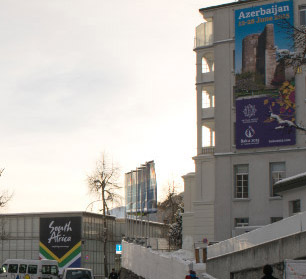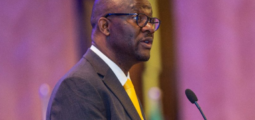Davos: Azerbaijan Making a Splash at World Economic Forum

Davos: WEF 2015. Photo: Copyright © CFI.co
Davos – One of the world’s fastest growing economies for ten years in a row, Azerbaijan is set to showcase its accomplishments and promising future outlook at the annual meeting of World Economic Forum set to kick off tomorrow in Davos, Switzerland. The Azerbaijani delegation, headed by President Ilham Aliyev and First Lady Mehriban, has established its headquarters at the landmark Belvédère Grand Hotel, ready to detail the country’s exceptionally strong economic performance in the face of dwindling oil prices.
The Azerbaijan economy managed to expand its GDP by 3% in 2014. Growth was boosted by a 7% increase in non-oil activities. Inflation remained low at 1.4% while disposable income grew by 4.8%. Investments attained $27bn of which $16bn was generated domestically.
Presiding over a cabinet meeting to review the economic achievements of the past year, President Aliyev earlier this month drew attention to the steady improvement of his country’s ranking on the Global Competitiveness Report, compiled annually by the World Economic Forum (WEF). Currently ranked the world’s 38th most competitive economy – up one notch from the previous year and well ahead of economic powerhouses such as South Africa, Brazil, Turkey, and Poland – President Aliyev congratulated his cabinet on the “historic achievement.”
“As financial, economic, and political uncertainties elsewhere in the world lead to severe budgetary constraints, reduced investments, and an overall decline in social wellbeing, Azerbaijan is deftly bucking this global trend, upping the ante with a slew of new infrastructure projects slated for execution and meant to underpin the country’s sustained development.”
Tying into income and wealth inequality – this year’s overriding issue at the World Economic Forum’s flagship meeting in Davos – President Aliyev emphasised that Azerbaijan is making significant headway with average salaries rising to well over $7,000 annually and the state providing sustained social assistance to over 90,000 families at risk of being left behind as the country barrels towards higher levels of prosperity. The president also noted that poverty rates are decreasing rapidly as the unemployment level dropped to under 5%.
Last year, the Azerbaijan economy created over 123,000 new jobs. At the same time, 230 new industrial enterprises were founded. As financial, economic, and political uncertainties elsewhere in the world lead to severe budgetary constraints, reduced investments, and an overall decline in social wellbeing, Azerbaijan is deftly bucking this global trend, upping the ante with a slew of new infrastructure projects slated for execution and meant to underpin the country’s sustained development.
Considered a one-party dominant state, Azerbaijani politics struggle with the need for further political reform. Though opposition parties such as the Azerbaijan Popular Front are allowed to operate, their political sway is minimal. The 2010 parliamentary elections were won by the ruling Yeni Azerbaijan Party of President Aliyev. The party claimed 73 of the parliament’s 125 seats with most of the remainder going to “soft opposition” parties. While the United States concluded that the election failed to meet international standards, the Organisation for Security and Cooperation in Europe (OSCE) did find some encouraging signs of improvement.
The Azerbaijani ruler does seem to be motivated by a genuine, albeit rather absolutist, concern for the wellbeing of his fellow countrymen. Boosted by oil revenue, the Aliyev Administration has consistently delivered high economic growth rates, leveraging the country’s vast hydrocarbon reserves to attract more than $60bn in foreign investment.
Azerbaijan has been more successful than most former Soviet republics in making the transition from a command to a market economy. A number of far-reaching reforms successfully injected a degree of entrepreneurial dynamism into the economy. During the cabinet meeting of January 10, President Aliyev said that his country has already undergone a number of political reforms that now assure freedom of speech, assembly, conscience, and religion.
“The Internet is also uncensored,” said the president who tweeted three days later to his 110,000+ followers on Twitter that Azerbaijan offers its “own model of unique economic development and political reform.” As the middle class swells it ranks, calls for additional political reform may intensify, requiring President Aliyev to display an acumen similar to the one he exhibited while successfully reforming the country’s economy.
While in Davos, President Aliyev and First Lady Mehriban – featured in a recent CFI.co hero profile – are also expected to present an update on the preparations for the upcoming European Games. The inaugural edition of this sports event will see over 6,000 athletes – representing the National Olympic Committees of all European countries – competing for seventeen days in brand-new purpose-built facilities in the Azerbaijani capital Baku. The grand opening ceremony scheduled for June 12.
The organising committee for the first European Games is chaired by First Lady Mehriban Aliyev who is also an executive member of Azerbaijan’s National Olympic Committee. With less than 150 days remaining before the event gets underway, preparations are nearing completion. In Davos, Mrs Aliyev and her husband will host a dinner gala event at the InterContinental for hundreds of guests to report on the latest developments surrounding Baku 2015. European Olympic Committee President Patrick Hickey will also address the dinner guests.
The organisers of the Baku 2015 mega-event set up a comprehensive exhibition at the hotel where Davos attendees may get the inside scoop on the first-ever European Games.
You may have an interest in also reading…
Over 1,700 Projects Worth USD 1tn Fall Under China’s Ambitious One Belt, One Road Initiative (OBOR)
Annual Investment Meeting 2019 to host AIM-OBOR Forum With more than 1,700 projects worth USD 1 trillion, China’s ambitious One
UNCDF: A Roadmap for Financial Inclusion
Nephathli is a man from Lesotho, formerly a mineworker in South Africa. His family’s main source of income is the
UNIDO: Nowadays it’s Tough on Tigers
Poorer developing countries may find it much harder under current conditions to foster industrial development and structural change than earlier

















































































